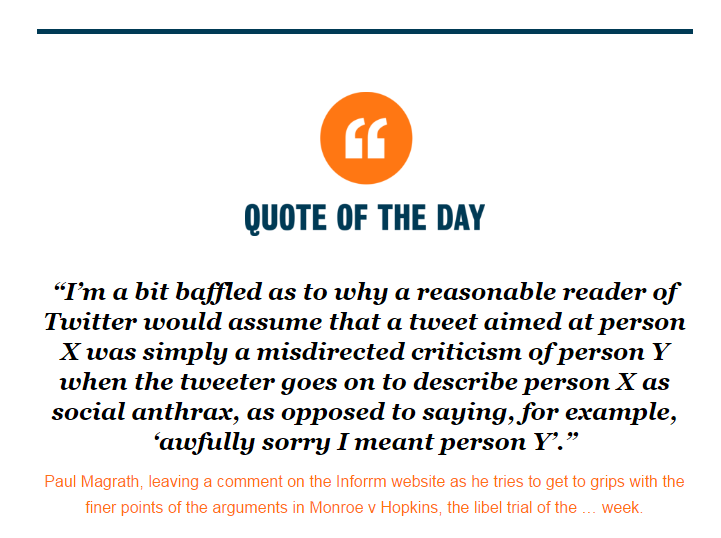Weekly Notes: legal news from ICLR — 6 March 2017
This week’s roundup of legal news and commentary deals with snooping, whistleblowing and journalism as well as judicial appointments and legal aid fees. Stormy political weather continues across the pond. Investigatory powers Judicial Commissioner appointed Lord Justice Fulford has been appointed the the first Investigatory Powers Commissioner, with authority to authorise and scrutinise the use of… Continue reading
This week’s roundup of legal news and commentary deals with snooping, whistleblowing and journalism as well as judicial appointments and legal aid fees. Stormy political weather continues across the pond.
Investigatory powers
Judicial Commissioner appointed
Lord Justice Fulford has been appointed the the first Investigatory Powers Commissioner, with authority to authorise and scrutinise the use of intrusive capabilities by GCHQ, MI5, MI6 and other public bodies. According to the official announcement:
Section 227 of the Investigatory Powers Act 2016 provides for the Prime Minister to appoint the Investigatory Powers Commissioner (IPC). The role of the IPC is to authorise and oversee the use of Investigatory Powers by public authorities. Sir Adrian will now begin work on establishing his office, and will take on the statutory functions of the IPC in due course.
Sir Adrian Fulford, 64, is currently the senior presiding judge in England and Wales and has been in charge of a project to modernise the courts. Although his role is concerned with anti-terrorism measures, it is not to be confused with that of the Independent Reviewer of Terrorism Legislation, to which Max Hill QC was appointed last month, replacing David Anderson QC, who has held the post since 2011. That role, according to the Home Secretary Amber Rudd when appointing him, is to provide “robust oversight to ensure our counter-terrorism laws are fair, necessary and proportionate”. You can read the annual reports which he is required to lay before Parliament here.
Protection of journalistic sources and whistleblowers
The Information Law and Policy Centre at the Institute of Advanced Legal Studies has published a report, written by media law academics Dr Judith Townend and Dr Richard Danbury, into the protection of confidential source and whistleblower protection in the light of current legislation (including the Investigatory Powers Act) and the surveillance regime in operation in the UK at the moment. An update document refers to the Digital Economy Bill currently going through Parliament and proposals by the Law Commission to review the protection of official data and update the Official Secrets Acts. The key findings of the main report are:
• The UK Government has, in recent years, pursued a number of policies and legislative proposals that have substantially weakened protections for sources. Most urgently, these include the Investigatory Powers Act that has recently become law and the Digital Economy Bill currently being considered by Parliament.
• Technological change means that journalists, freelancers and publications are faced with previously unprecedented difficulties in protecting their sources. The technological protections for sources have not kept pace with the ability of states and other actors to use technology to intercept or monitor communications.
• Although a number of domestic and European legal protections exist for the protection of confidential sources, their effectiveness is considerably weakened by technology that provides an easy route to information; and the use of covert powers to which journalists and sources may be oblivious.
• Working investigative journalists and media lawyers, many with several decades of experience, are profoundly concerned about the growing technological and legal vulnerability of confidential sources including whistleblowers, the protection of whom is essential to the pursuit of responsible journalism in the public interest.
• There is a need to strengthen whistleblower protection legislation in the UK.
The report makes a number of recommendations, the first of which is that policymakers and lawmakers
Guarantee that the Investigatory Powers Act Codes of Practice sufficiently protect journalists and their anonymous sources, in ways compliant with the UK’s international human rights obligations.
Those IPA codes of practice are now the subject of a consultation, launched last month.
The five codes are concerned with:
- Interception of communications
- Bulk communications data acquisition
- Bulk personal datasets
- Equipment interference
- National Security Notices
Following consideration of the responses to the consultation and any consequent amendments, the codes will need to be laid before Parliament for approval. The consultation will last six weeks. Copies of the consultation document and draft codes are available on the consultation page.
See also:
- Out-Law.com, Technology making protection of sources more difficult for journalists, says new report
- UK Human Rights blog: The Front Page in the Digital Age: Institute of Advanced Legal Studies publishes report on protecting journalists’ sources
- information Law and Policy Centre: Press and Media Coverage of ‘Protecting Sources and Whistleblowers in a Digital Age’ Report (where further updates will be added).
Media law
QB Media and Communications List
The Queen’s Bench Division has spawned yet another specialist subdivision, to join the Administrative Court (formerly the Crown Office list), the Admiralty Court (formerly part of the Probate, Divorce and Admiralty division, until that became the Family Division in 1972), the Commercial Court, the Mercantile Court, and the Technology and Construction Court.
The new Media and Communications List will deal with defamation, misuse of private information and breach of duty under the Data Protection Act and related or similar claims including malicious falsehood and harassment arising from publication or threatened publication by the print or broadcast media, online, on social media, or in speech.
The judge appointed to head up this new section is Mr Justice Warby, formerly of 5RB media law chambers, who has also been in the news this week as the judge hearing the high profile Twitter libel case of Monroe v Hopkins, a preview of which was helpfully (and apparently very popularly) supplied by Inforrm’s blog, along with daily reports.
In days of yore, such a case would be been heard before a jury and a media circus would have added to the public entertainment provided by the two fairly high profile parties, but Warby J heard the case alone, there was a lot of technical argument about the Wild West, and Ms Hopkins did not even take the stand. Whether she is right to be so confident in her own inability to do serious harm to someone’s reputation (section 1 of the Defamation Act 2013) remains to be seen. Judgment has been reserved.
See also: Gazette, Media law cases get their own court
Judiciary
Recruitment woes
Following last week’s report on the hunt for a replacement Lord Chief Justice and other judicial posts, there has been discussion in the last week of the factors inhibiting the recruitment of top judges. Pay is an important consideration, it seems, but not necessarily the only one. Low morale and a sense of not being properly valued by politicians and the public seem to loom larger as factors in dissuading successful lawyers to give up their private or corporate practice for a seat on the Bench.
Last week the Lords constitution committee heard evidence from the Lord Chancellor, Liz Truss (watch video) and also from Professor Lord Kakkar, Chair of the Judicial Appointments Commission.
While Truss defended her reluctance to criticise the more strident voices of media criticism of the judiciary (however ill deserved), she expressed the wish that judges themselves should speak out more, and thought this would boost morale and aid recruitment. But although judges are happy to give speeches and speak at conferences, they are most of them not natural providers of soundbites and a policy of encouraging them to appear on Channel 4 News or BBC Newsnight and defend themselves against often ill informed attacks by random commentators seems to me unwise. Politicians always look ridiculous when they respond by trotting out some well rehearsed party line about the subject without addressing the specific questions put to them. It just makes them look shifty. Judges should not fall into that bear-trap.
On the other hand, they could look at the way they write judgments, given that much of the criticism is directed at their handling of particular cases, and maybe undergo some training in expressing themselves both forcefully and clearly in ways that reduce the sting of public criticism. The practice of writing short summaries (or having them written, as in the Supreme Court) to accompany judgments in newsworthy or controversial cases is an excellent one and should be extended and promoted. Such summaries should also be visibly publicly available, from an easily accessible site (ie not Judiciary.gov) given the reluctance of many online news media to link to or cite judgments and other official publications when providing inadequate or biased or sometimes just plain wrong accounts of their contents.
I would exclude from that criticism the Guardian, whose report on the Lords committee is full of useful links to sources: see Courts are running out of qualified judges, peers are told. It notes
Many judges are thinking of quitting the bench early because they feel poorly paid, undervalued and fear for their personal safety in court, a recent judicial attitudes survey revealed.
Lord Justice Burnett, vice-chair of the Judicial Appointments Commission (JAC), told peers that in the most recent search for 55 new crown court judges, only 44 were selected for appointment.
The survey may be found here. Judges reported a continuing deterioration in their working conditions, greater concerns for their personal safety, worsening morale caused in part by low salary and pension benefits and for these and other reasons they would discourage others to apply for judicial appointments.
Who knows – perhaps if we gave them the handsome cedar or mahogany gavels that TV drama companies and the advertising industry seem to think they already have and use, perhaps potential judges might be more willing to occupy a chair at the, er, bench.
E Pluribus Ursus
In other, slightly less serious news, there has been disappointment over the apparent rejection of an application by “the bears of the Supreme Court and the Judicial Committee of the Privy Council” for the post of President of the Supreme Court on a job-sharing basis, which was presented on their behalf in a post by Isobel Williams on her Drawing from an Uncomfortable Position blog.
A reminder that the Closing date for applications for both President of the Supreme Court of the United Kingdom and two or possibly three Justices of the Supreme Court of the United Kingdom
is 12.00 noon on 10 March 2017. For more details, see Supreme Court website.
Legal aid
Advocates’ Graduated Fee Scheme
Few things have caused more angst at the criminal bar than the AGFS, on which there has been consultation (which closed on 2 March) but also a lot of commentary. Earlier we reported on the Litigators’ Graduated Fees Scheme: see Weekly Notes on 20 February. The LGFS and the AGFS are two sides to a single coin, the GFS which is designed to redistribute fees for criminal defence work without actually costing the government any money. Both were subject to consultation.
Responses to the consultations:
- The Bar Council have responded to the AGFS consultation in broadly supportive terms, but with a number of suggestions to improve the outcome for barristers in future.
- Gazette. Solicitors to ‘vociferously oppose’ fee cuts
- The Secret Barrister, Guest Post by DefenceGirl: The fallacy of the fat cat legal aid lawyer
- Gazette, Bar backs MoJ fee scheme restructure – with reservations
- A view from the North blog, Please Sir, Can I Have Some More?
Police
Operation Lavender report
More news about the shocking case of Poppi Worthington, a 1 year old girl who died in 2012, and who the Family Court ruled was seriously sexually assaulted by her Father shortly before her death, though the CPS did not in the end proceed with a criminal prosecution. After a delay of almost two years, after it was completed on 13 March 2015, the report of an investigation by the Independent Police Complaints Commission (IPPC) into failures in the Police investigation has finally been released, plus a short addendum.
The IPCC has said that the delay was necessary to avoid any prejudice to ongoing disciplinary and/or potential criminal proceedings. The report is critical of the original police investigation, failing to appreciate the possibility of a crime, despite suspicious circumstances, and to retain crucial evidence for any prosecution.
See also: Guardian, Police watchdog attacks Poppi Worthington death inquiry
Dates and Deadlines
The Bubble Reputation: Protecting, Inflating, Deflating and Preserving it
8 March 2017, Information Law and Policy Centre, IALS, 6pm to 8pm.
Charles Clore House, 17 Russell Square, London, WC1B 5DR
The Four Jurisdictions Law Conference
Dublin, Friday 5 May to Sunday 7 May 2017
Registration now open, via the Bar of Ireland Law Library
Law (and injustice) from around the world
America
Secret Sessions – Russian to judgment on Capitol Hill
 There seems to be a serious problem with President Trump’s team and relations with Russia, which Trump has made no secret during his election campaign of wanting to improve. The problem is not that members of his team have been in touch with the Russian ambassador and other officials. It’s that they made a secret of the fact and were then found out. Last month, it was Trump’s then newly appointed national security adviser, Michael Flynn, who was forced to resign over covering up his talks with Russian contacts.
There seems to be a serious problem with President Trump’s team and relations with Russia, which Trump has made no secret during his election campaign of wanting to improve. The problem is not that members of his team have been in touch with the Russian ambassador and other officials. It’s that they made a secret of the fact and were then found out. Last month, it was Trump’s then newly appointed national security adviser, Michael Flynn, who was forced to resign over covering up his talks with Russian contacts.
The latest victim of faulty memory syndrome is America’s top law officer, the newly appointed (in spite of stiff opposition on the Hill) Attorney General, Jeff Sessions, who declared on oath before Congress that he had not had any personal conversations with the Russian ambassador during the election campaign. It later transpired that he had. He claims they were not related to the election. Never mind, he could have been more candid to Congress. He was, as one British mandarin once put it, a little “economical with the truth”. Or as Trump later admitted, he could have “stated his response more accurately”.
Amid calls (mainly from senior Democrats) for his resignation, Sessions has given way to the extent of recusing himself from the investigation being carried out within his department into possible Russian interference in the 2016 election. Trump with his characteristic statesman-like reticence described the development as a “total witch-hunt” and then began distracting everyone with early morning tweets alleging his predecessor, President Obama, had bugged his offices in Trump Tower, just like Watergate. No evidence has been proferred, as far as I am aware at the time of writing. But in case no one took that seriously, he also tweeted disdainfully about Arnold Schwarzenegger, his (less successful) successor on the TV show Trump once hosted.
See (with links and image): Guardian, Jeff Sessions recuses himself from Russia inquiry amid calls for resignation
Australia
Open justice under threat from suppression orders
The popular press in the UK are fond of accusing our judges of administering “secret justice” from “behind closed doors” but we are not alone is needing to ensure that justice is not only done, but is seen to be done (Scott v Scott [1913] UKHL 2; [1913] AC 417 and R v Sussex Justices, Ex p McCarthy [1923] EWHC KB 1; [1924] 1 KB 256, 259 per Lord Hewart CJ). Nevertheless, there are often good reasons for limiting the scope of the public and media representatives’ access to, or reporting of, court proceedings, usually for reasons of confidentiality and to protect the interests of justice or of children and other vulnerable parties involuntarily caught up in proceedings.
In Australia, in the state of Victoria, there is something called a suppression order which prevents the media reporting cases or limiting what they can say, and concern has been expressed that these statutory powers have been used perhaps too liberally by the courts. In a post on Inforrm’s blog, Jason Bosland, of the University of Melbourne, flags up some research conducted for publication in the Sydney Law Review, on Two Years of Suppression under the Open Courts Act 2013 (Vic) (pdf).
There are, of course, legitimate reasons for suppression. Sometimes suppression orders are necessary to prevent prejudice to the fair trial of an accused. In other cases they can be made to protect the safety of a person or to protect the victim or witness in a case from suffering undue embarrassment. But what my research shows is that orders are increasingly broad and ambiguous in scope and that they often lack sufficient legal foundation.
And finally… comment of the week
from the Times law Brief. 28 February 2017.
That’s it for now. Our thanks to all who flagged up stories, via their blogs (which we always try to acknowledge) and via Twitter (where useful tweets are retweeted).
This post was written by Paul Magrath, Head of Product Development and Online Content at ICLR, who also tweets as @maggotlaw. It does not necessarily represent the opinions of ICLR as an organisation. Comments welcome on Twitter @TheICLR.
Sign up now for weekly email alerts from this blog. Just put your email address into the box on the left.


